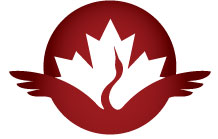
Han Voice Chair Randall Baran-Chong and MP Barry Devolin
Two inter-related events quietly happened this past week.
The first event took place in Ottawa last Thursday, as the inaugural John Diefenbaker Defender of Human Rights and Freedom Award was awarded to the Citizens Alliance for North Korean Human Rights (or “NKHR”). This achievement, the brainchild of an up-and-coming DFAIT staffer, was given by none other than Minister of Foreign Affairs Lawrence Cannon.
The second event took place in Toronto last Saturday. An open forum was co-hosted by HanVoice, the Citizens Alliance, as well as the Toronto Korean consulate at the University of Toronto. As part of the event, several speakers, including Benjamin Yoon (chairman of NKHR), the South Korean consul general, and Member of Parliament Barry Devolin gave some opening remarks. These opening addresses were followed by a short panel discussion by Chris Kim and Sydney Choi of HanVoice, Pam Shime from the Global Advocacy & Leadership Institute, Suk Woo Kim from NKHR, and Ashley Eom from NKHR. The panelists spoke about wide-and-varied topics, including possible private sponsorship and education programs for North Korean refugees, the potential for the issue of children (and especially stateless children) as a possible wedge issue regarding human rights advocacy, food aid, and the rampant sexual trafficking of female North Korean refugees in China.
The two events may signal a subtle shift in how the government of Canada starts talking about (and hopefully, with) the DPRK. Although no one had really heard of the Diefenbaker prize for human rights before it was issued (and indeed, some are confused with the other Diefenbaker prize out there), the fact that that a North Korean human rights organization was chosen out of the myriad of worthy candidates is of note. And perhaps at the risk of reading the political tea leaves a bit more, it is of particular note that the inaugural award was given to an established South Korean organization that is NOT a rabidly right-wing “regime change at all costs” oriented organization. Having been privately part of the consultation process, I can attest to the fact that such organizations were indeed brought to the attention of the powers-that-be.
At the very least, it does signal that those inside DFAIT are aware of the human rights issues in North Korea – both on the political and bureaucratic side.
At the Toronto event, Member of Parliament Devolin took some time to outline a new motion that will be imminently brought forth at the House of Commons. M-369, as the call sign has been designated for the motion (“Maverick” was unavailable at the time), reads as such:
That, in the opinion of the House, the government should:
(a) express its concern over the situation of citizens of the Democratic People’s Republic of Korea (DPRK) who have fled to China and who fear imprisonment, torture and potential execution if forcibly returned to their country; and
(b) encourage the government of China to work with the international community, including Canada and the United Nations High Commission of Refugees, to find a solution that respects China’s right to defend its borders and security while upholding the rights of DPRK citizens, as articulated by the United Nations Convention Relating to the Status of Refugees.
The motion itself will first be brought forth very soon, at the end of March, and will most likely be voted on in May.
As Devolin himself pointed out on Saturday, his motion adopts a new approach to the North Korean refugee issue that departs from the rather incendiary language that had previously lambasted China for its treatment of North Korean border crossers. Rather, the motion envisions a situation (albeit an ideal one) where Beijing and Ottawa join together to find a common solution to the increasing number of North Korean refugees that are spilling across the DPRK-PRC border.
Member of Parliament Devolin’s goal is not to simply pass the motion; rather it is to pass the motion unanimously. Devolin commented that despite its non-binding effect, a unanimously passed resolution signals a strong message that the elected representatives of Canada’s Parliament are concerned, and more importantly, beyond any division, concerned about the plight of North Korean refugees. As such, if M-369 survives what may be a spring election and is adopted unanimously, it will become the first voted-on legislation of its kind to be adopted by the House of Commons to address North Korean human rights (and to a larger extent, in recent memory, North Korea in general).
As I wrote above, this does not signal any groundbreaking shift in the government of Canada’s DPRK policy. As with most other governments in the world, everything DPRK has more been about its weapons more than anything else. However, with human rights slowly creeping into the language that is being used in the same sentence as “North Korea,” one wonders whether this will reflect at least some of the dialogue that will come out of the government of Canada’s proverbial mouth.
The more interesting question now is why this new interest with North Korean human rights at this point of time? Is it because North Korea avails itself to the headlines more so now than ever? Is it because government leaders are thinking of the DPRK more, as the leadership in Pyongyang transitions to a new generation and the future of the country is less than certain? Or, to feed my own vanity, is it the product of activism on the part of Canadians, and an increased interest in North Korea within the Korean-Canadian community as a whole? Or is it a potpourri of “all of the above?”
Only time will tell.



1 April 2011 at 16:47
[…] The Government of Canada Speaks (Just A Little, For Now) […]
5 April 2011 at 13:39
[…] The Government of Canada Speaks (Just A Little, For Now) […]
21 April 2011 at 17:40
agreed! nice way of puttin’ it man